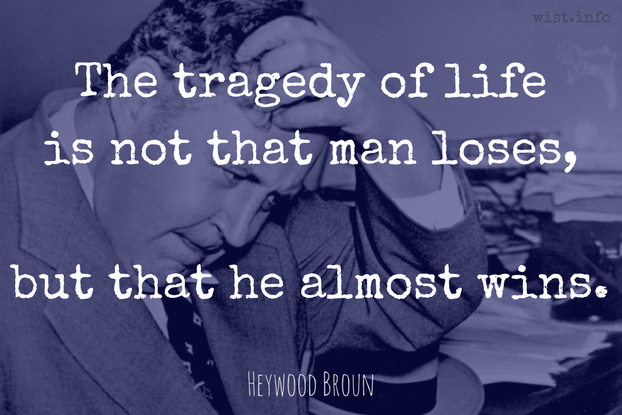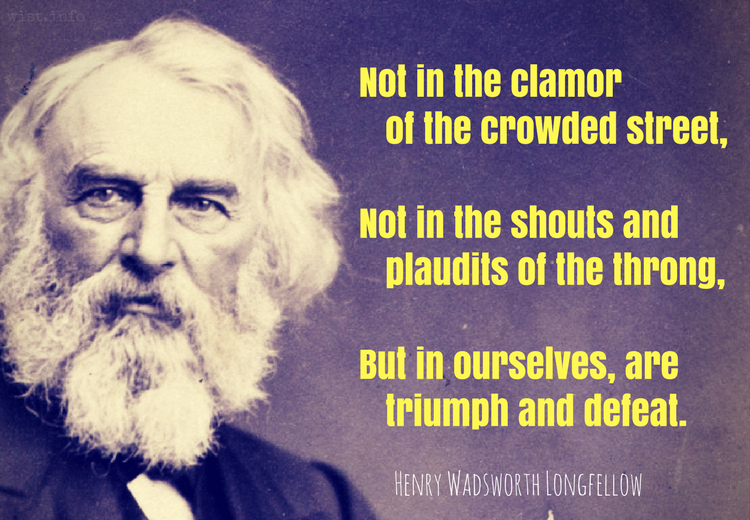FRIAR: For it so falls out
That what we have we prize not to the worth,
Whiles we enjoy it, but being lacked and lost,
Why then we rack the value, then we find
The virtue that possession would not show us
Whiles it was ours.William Shakespeare (1564-1616) English dramatist and poet
Much Ado About Nothing, Act 4, sc. 1, l. 228ff (4.1.228-233) (1598)
(Source)
Quotations about:
loss
Note not all quotations have been tagged, so Search may find additional quotes on this topic.
LAZARUS: You’re so sentimental, Doctor. Maybe you are older than you look.
THE DOCTOR: I’m old enough to know that a longer life isn’t always a better one. In the end, you just get tired; tired of the struggle, tired of losing everyone that matters to you, tired of watching everything you love turn to dust. If you live long enough, Lazarus, the only certainty left is that you’ll end up alone.
LAZARUS: That’s a price worth paying.
THE DOCTOR: Is it?
Stephen Greenhorn (b. 1964) Scottish playwright and screenwriter
Doctor Who, (2005) 03×06 “The Lazarus Experiment” (2007-05-05)
(Source)
Let us not envy a certain class of men for their enormous riches; they have paid such an equivalent for them that it would not suit us; they have given for them their peace of mind, their health, their honour, and their conscience; this is rather too dear, and there is nothing to be made out of such a bargain.
[N’envions point à une sorte de gens leurs grandes richesses; ils les ont à titre onéreux, et qui ne nous accommoderait point: ils ont mis leur repos, leur santé, leur honneur et leur conscience pour les avoir; cela est trop cher, et il n’y a rien à gagner à un tel marché.]Jean de La Bruyère (1645-1696) French essayist, moralist
The Characters [Les Caractères], ch. 6 “Of Gifts of Fortune [Des Biens de Fortune],” § 13 (6.13) (1688) [tr. Van Laun (1885)]
(Source)
One translator suggestions the "certain class of men" refers to the partisans, or tax-farmers: private tax collectors, often of humble origin, who purchased the right to their job, and were notorious for turning tax collection into a profitable profession.
(Source (French)). Alternate translations:
Let us not envy some Men their great Riches; their Burthens would be too heavy for us; we cou'd not Sacrifice, as they do, Health, Quiet, Honour and Conscience, to obtain 'em: 'Tis to pay so dear for them that there is nothing to be got by the Bargain.
[Bullord ed. (1696)]
Let us not envy some Men their great Riches, their burden would be too heavy for us; we cou'd not sacrifice, as they do, Health, Quiet, Honour and Conscience, to obtain 'em: 'Tis to pay so dear for 'em, that there is nothing to be got by the Bargain.
[Curll ed. (1713)]
Let us not envy some Men their accountable Riches; their Burthen would be too heavy for us; we could not sacrifice, as they do, Health, Quiet, Honour and Conscience, to obtain them. It is to pay so dear for them, that the Bargain is a Loss.
[Browne ed. (1752)]
We need not envy certain people their great wealth; they acquired it at a heavy cost, which would not suit us; they staked their rest, their health, their honour and their conscience to acquire it; the price is too high, and there is nothing to be gained by such a bargain.
[tr. Stewart (1970)]
Life is truly known only to those who suffer, lose, endure adversity, and stumble from defeat to defeat.
Ryszard Kapuściński (1932-2007) Polish journalist, photographer, poet, author
“A Warsaw Diary,” Granta Magazine, No. 15 (1985 Spring)
(Source)
I know which side my bread is buttered on: the side which falls on the carpet.
Mignon McLaughlin (1913-1983) American journalist and author
The Second Neurotic’s Notebook, ch. 10 (1966)
(Source)
Farewell!
For in that word — that fatal word — howe’er
We promise — hope — believe, — here breathes despair.George Gordon, Lord Byron (1788-1824) English poet
The Corsair, Canto 1, st. 15, l. 86ff (1814)
(Source)
There’s not a joy the world can give like that it takes away.
There are certain people who so ardently and so passionately desire a thing, that from dread of losing it they leave nothing undone to make them lose it.
[Il y a de certaines gens qui veulent si ardemment et si déterminément une certaine chose, que de peur de la manquer, ils n’oublient rien de ce qu’il faut faire pour la manquer.]
Jean de La Bruyère (1645-1696) French essayist, moralist
The Characters [Les Caractères], ch. 4 “Of the Heart [Du Coeur],” § 61 (4.61) (1688) [tr. Van Laun (1885)]
(Source)
(Source (French)). Alternate translations:
There are those People, who so ardently and passionately desire a thing, that for fear they shall lose it, they leave nothing undone that may surely make 'em lose it.
[Bullord ed. (1696)]
There are certain People, who so ardently and passionately desire a thing, that out of fear of losing it, they leave nothing undone to make 'em lose it.
[Curll ed. (1713)]
Some so ardently and passionately desire a thing, that out of fear of losing it, they run into Measures which infallibly makes them lose it.
[Browne ed. (1752)]
There are some people who are so ardently and resolutely bent on gaining a certain thing that, for fear of losing it, they do everything that is likely to lose it for them.
[tr. Stewart (1970)]
Many pleasant things are better when they belong to someone else. You can enjoy them more that way. The first day, pleasure belongs to the owner; after that, to others. When things belong to others, we enjoy them twice as much, without the risk of losing them, and with the pleasure of novelty. Everything tastes better when we are deprived of it.
[Muchas cosas de gusto no se han de poseer en propiedad. Más se goza de ellas ajenas que propias. El primer día es lo bueno para su dueño, los demás para los extraños. Gózanse las cosas ajenas con doblada fruición, esto es, sin el riesgo del daño y con el gusto de la novedad. Sabe todo mejor a privación.]
Baltasar Gracián y Morales (1601-1658) Spanish Jesuit priest, writer, philosopher
The Art of Worldly Wisdom [Oráculo Manual y Arte de Prudencia], § 264 (1647) [tr. Maurer (1992)]
(Source)
(Source (Spanish)). Alternate translations:
Many things that serve for pleasure, ought not to be peculiar. One enjoys more of what is another's, than of what belongs to himself. The first day is for the Master, and all the rest for Strangers. One doubly enjoys what belongs to others, that's to say, not only without fear of loss, but also with the pleasure of Novelty. Privation makes every thing better.
[Flesher ed. (1685), §263]
Many things of Taste one should not possess oneself. One enjoys them better if another's than if one's own. The owner has the good of them the first day, for all the rest of the time they are for others. You take a double enjoyment in other men's property, being without fear of spoiling it and with the pleasure of novelty. Everything tastes better for having been without it.
[tr. Jacobs (1892)]
Many of the things that bring delight should not be owned. They are more enjoyed if another's, than if yours; the first day they give pleasure to the owner, but in all the rest to the others: what belongs to another rejoices doubly, because without the risk of going stale, and with the satisfaction of freshness; everything tastes better after fasting.
[tr. Fischer (1937)]
In any man who dies there dies with him,
his first snow and kiss and fight.[И если умирает человек,
с ним умирает первый его снег,
и первый поцелуй, и первый бой…]Yevgeny Yevtushenko (1933-2017) Russian poet, writer, film director, academic [Евге́ний Евтуше́нко, Evgenij Evtušenko]
“People” (1961), l. 12ff, Selected Poems (1962)
(Source)
All changes are more or less tinged with melancholy, for what we are leaving behind is part of ourselves.
Amelia E. Barr (1831-1919) British novelist and teacher.
All the Days of My Life, ch. 6 (1913)
(Source)
See Anatole France.
PROTEUS: Oh, how this spring of love resembleth
The uncertain glory of an April day;
Which now shows all the beauty of the sun,
And by and by a cloud takes all away!
William Shakespeare (1564-1616) English dramatist and poet
Two Gentlemen of Verona, Act 1, sc. 3, l. 85ff (1.3.85-88) (c. 1590)
(Source)
Fascist politics feeds off the sense of aggrieved victimization caused by loss of hierarchal status. Empires in decline are particularly susceptible to fascist politics because of this sense of loss. It is in the very nature of empire to create hierarchy; empires legitimize their colonial enterprises by the myth of their own exceptionalism. In the course of decline, the population is easily led to a sense of national humiliation that can be mobilized in fascist politics to serve various purposes.
Jason Stanley (b. 1969) American philosopher, epistemologist, academic
How Fascism Works: The Politics of Us and Them, ch. 5 (2018)
(Source)
Every man is bound to bear his own misfortunes rather than to get quit of them by wronging his neighbour.
[Suum cuique incommodum ferendum est potius quam de alterius commodis detrahendum.]
Marcus Tullius Cicero (106-43 BC) Roman orator, statesman, philosopher
De Officiis [On Duties; On Moral Duty; The Offices], Book 3, ch. 5 (3.5) / sec. 30 (44 BC) [tr. Cockman (1699)]
(Source)
(Source (Latin)). Alternate translation:
Every man ought to bear his own evils, rather than wrong another, by stripping him of his comforts.
[tr. McCartney (1798)]
It is rather the duty of each to bear his own misfortune, than wrongfully to take from the comforts of others.
[tr. Edmonds (1865)]
Each man must bear his own privations rather than take what belongs to another.
[tr. Peabody (1883)]
A man should bear his own misfortune rather than trench upon the good fortune of another.
[tr. Gardiner (1899)]
It is the duty of each man to bear his own discomforts, rather than diminish the comforts of his neighbor.
[ed. Harbottle (1906)]
Each one must bear his own burden of distress rather than rob a neighbour of his rights.
[tr. Miller (1913)]
Each man should endure his own suffering rather than reduce the benefits of another person.
[tr. Edinger (1974)]
Nostalgia for what we have lost is more bearable than nostalgia for what we have never had, for the first involves knowledge and pleasure, the second only ignorance and pain.
Mignon McLaughlin (1913-1983) American journalist and author
The Neurotic’s Notebook, ch. 4 (1963)
(Source)
if you don’t have much soul left and you know it, you still got soul.
Charles Bukowski (1920-1994) German-American author, poet
“A Dollar and Twenty Cents” (1967)
(Source)
Often misquoted as "If you're losing your soul and you know it, then you've still got a soul left to lose."
If I had to name my disability, I would call it an unwillingness to fall. On the one hand, this is perfectly normal. I do not know anyone who likes to fall. But, on the other hand, this reluctance signals mistrust of the central truth of the Christian gospel: life springs from death, not only at the last but also in the many little deaths along the way. When everything you count on for protection has failed, the Divine Presence does not fail. The hands are still there — not promising to rescue, not promising to intervene — promising only to hold you no matter how far you fall. Ironically, those who try hardest not to fall learn this later than those who topple more easily. The ones who find their lives are the losers, while the winners come in last.
Barbara Brown Taylor (b. 1951) American minister, academic, author
Leaving Church: A Memoir of Faith, Part 3, ch. 17 (2006)
(Source)
A garden is always a series of losses set against a few triumphs, like life itself.
May Sarton (1912-1995) Belgian-American poet, novelist, memoirist [pen name of Eleanore Marie Sarton]
At Seventy: A Journal, “Wednesday, June 23rd” (1973)
(Source)
A thief can rifle any till,
A fire with ash your home can fill,
A creditor calls in your debt.
Bad harvest does your farm upset,
An impish mistress robs your dwelling,
Storm shatters ships with water swelling.
But gifts to friends your friendships save.
You keep thus always what you gave.[Callidus effracta nummos fur auferet arca,
Prosternet patrios impia flamma lares:
Debitor usuram pariter sortemque negabit,
Non reddet sterilis semina iacta seges:
Dispensatorem fallax spoliabit amica,
Mercibus extructas obruet unda rates.
Extra fortunam est, quidquid donatur amicis:
Quas dederis, solas semper habebis opes.]Martial (AD c.39-c.103) Spanish Roman poet, satirist, epigrammatist [Marcus Valerius Martialis]
Epigrams [Epigrammata], Book 5, epigram 42 (5.42) (AD 90) [tr. Wills (2007)]
(Source)
(Source(Latin)). Alternate translations:
The crafty thefe from battered chest,
doth filch thy coine awaie:
The debter nor the interest,
nor principall will pay.
The fearefull flame destroies the goods,
and letteth nought remaine:
The barren ground for seede recevd,
restoreth naught again.
The subtle harlot naked strips
her lover to the skin:
If thou commit thy self to seas,
great danger art thou in.
Not that thou gevest to thy frend,
can fortune take away:
That onely that thou givst thy friend,
thou shalt posses for ay.
[tr. Kendall (1577)]
Thieves may thy Coffers breake, steale coyne or plate;
Thy house a sudden fire may ruinate.
Debtors may Use, and Principall deny,
And dead thy seedes in barren Grounds may lye:
Thy Steward may be cheated by a Whore;
Thy Merchandise the Ocean may devour.
But what thou giv'st thy friends, from chance is free.
Thy gifts alone shall thine for ever be.
[tr. May (1629)]
Some felon-hand may steal thy gold away;
Or flames destructive on thy mansion prey.
The fraudful debtor may thy loan deny;
Or blasted fields no more their fruits supply.
The am'rous steward to adorn his dear,
With spoils may deck her from thy plunder'd year.
Thy freighted vessels, ere the port they gain,
O'erwhelm'd by storms may sink beneath the main:
But what thou giv'st a friend for friendship's sake,
Is the sole wealth which fortune n'er can take.
[tr. Melmoth (c. 1750)]
Thieves may break locks, and with your cash retire;
Your ancient seat may be consumed by fire;
Debtors refuse to pay you what they owe;
Or your ungrateful field the seed you sow;
You may be plundered by a jilting whore;
Your ships may sink at sea with all their store:
Who gives to friends, so much from Fate secures;
That is the only wealth for ever yours.
[tr. Hay (1755), ep. 43]
The thief shall burst thy box, and slyly go:
The impious flame shall lay thy Lares low.
Thy dettor shall deny both use and sum:
Thy seed deposited may never come.
A faithless female shall they steward spoil:
They ships are swallow'd, while thy billow boil.
Whate'er is bountied, quit vain fortune's road:
Thine is alone the wealth thou has bestow'd.
[tr. Elphinston (1782), Book 5, ep. 82]
A crafty thief may purloin money from a chest;
an impious flame may destroy paternal Lares;
a debtor may deny both principal and interest;
land may not yield crops in return for the seed scattered upon it;
frauds may be practices on a steward entrusted with your household purse;
the sea may overwhelm ships laden with merchandise.
Whatever is given to friends is beyond the reach of Fortune;
the wealth you have bestowed is the only wealth you can keep.
[tr. Amos (1858), ch. 3, ep. 77]
A cunning thief may burst open your coffers, and steal your coin;
an impious fire may lay waste your ancestral home;
your debtor may refuse you both principal and interest;
your corn-field may prove barren, and not repay the seed you have scattered upon it;
a crafty mistress may rob your steward;
the waves may engulf your ships laden with merchandise.
But what is bestowed on your friends is beyond the reach of fortune;
the riches you give away are the only riches you will possess for ever.
[tr. Bohn's Classical (1859)]
A present to a friend's beyond the reach of fortune:
That wealth alone you always will possess
Which you have given away.
[ed. Harbottle (1897)]
A cunning thief will break your money-box and carry off your coin,
cruel fire will lay low your ancestral home;
your debtor will repudiate interest alike and principal,
your sterile crop will not return you the seed you have sown;
a false mistress will despoil your treasurer,
the wave will overwhelm your ships stored with merchandise.
Beyond Fortune's power is any gift made to your friends;
only wealth bestowed will you possess always.
[tr. Ker (1919)]
Some thief may steal your wealth away,
Although by massive walls surrounded;
Or ruthless fire in ashes lay
The ancient home your fathers founded;
A debtor may withhold your dues,
Deny perhaps a debt is owing,
Or sullen ploughlands may refuse
To yield a harvest to your sowing.
A cunning trollop of the town
May make your agent rob his master,
Or waters of the ocean drown
Your goods and ship in one disaster.
But give to friends whate'er you may,
'Tis safe from fortune's worst endeavor:
The riches that you give away,
These only shall be yours for ever.
[tr. Pott & Wright (1921)]
Some cunning burglar will abstract your plate,
A godless fire your roof will devastate,
A debtor steal both interest and loan,
A barren field will turn your seed to stone.
A wily wench will strip your steward bare,
The greedy sea engulf your galleon's ware.
Give to a friend and fortune is checkmated;
Such wealth will ever as your own be rated.
[tr. Francis & Tatum (1924), #247]
A cunning thief may rob your money-chest,
And cruel fire lay low an ancient home;
Debtors may keep both loan and interest;
Good seed may fruitless rot in barren loam.
A guileful mistress may your agent cheat,
And waves engulf your laden argosies;
But boons to friends can fortune's slings defeat:
The wealth you give away will never cease.
[tr. Duff (1929)]
A cunning thief will break open your coffer and carry off your money, ruthless fire will lay low your family horne, your debtor will repudiate interest and principal alike, your barren fields will not return the scattered seed, a tricky mistress will rob your steward, the wave ,will overwhelm your ships piled high with merchandise: hut whatever is given to friends is beyond the grasp of Fortune. Only the wealth you give away will always be yours.
[tr. Shackleton Bailey (1993)]
Deft thieves can break your locks and carry off your savings,
fire consume your home,
debtors default on principal and interest,
failed crops return not even the seed you'd sown,
cheating women run up your charge accounts,
storm overwhelm ships freighted with all your goods.
Fortune can't take away what you give your friends:
that wealth stays yours forever.
[tr. Powell (c. 2000)]
The only wealth that's yours forever
is the wealth you give away.
[tr. Kennelly (2008), "Forever"]
Sly thieves will smash your coffer and steal your cash;
impious flames will wreck your family home;
your debtor won't repay your loan or interest;
your barren fields will yield less than you've sown;
a crafty mistress will despoil your steward;
a wave will swamp your ships piled high with stores.
But what you give to friends is safe from Fortune:
only the wealth you give away is yours.
[tr. McLean (2014)]
Savings -- the cunning thief will crack your safe and steal them;
ancestral home -- the fires don't care, they'll trash it;
the guy who owes you money -- won't pay the interest, won't pay at all.
Your field -- it's barren, sow seed and you'll get no return;
your girlfriend -- she'll con your accountant and leave you penniless;
your shipping line -- the waves will swamp your stacks of cargo.
But what you give to friends is out of fortune's reach.
The wealth you give away is the only wealth you'll never lose.
[tr. Nisbet (2015)]
Why do casinos lavish such gaudy gifts on someone who has just taken piles of their money? To ensure he doesn’t leave. The more gifts they give, the longer the gambler will stay. The longer he stays, the more likely he is to cough up his winnings. In fact, because of the false sense of his own skill he acquired while racking up his temporary purse, he’ll probably end up losing far more than he would have tolerated had he not found himself up in the first place. However cautious and determined people are when they begin, their good judgment goes out the window once they start to win.
If fate means you to lose, give him a good fight anyhow.
“What have we got to lose?” I said.
Nightingale looked up and gave me a strange, sad smile. “Oh, everything, Peter,” he said. “But then, such is life.”
To lose a friend, a brother, or a son,
Heaven dooms each mortal, and its will is done:
Awhile they sorrow, then dismiss their care;
Fate gives the wound, and man is born to bear.[μέλλει μέν πού τις καὶ φίλτερον ἄλλον ὀλέσσαι
ἠὲ κασίγνητον ὁμογάστριον ἠὲ καὶ υἱόν:
ἀλλ᾽ ἤτοι κλαύσας καὶ ὀδυράμενος μεθέηκε:
τλητὸν γὰρ Μοῖραι θυμὸν θέσαν ἀνθρώποισιν.]Homer (fl. 7th-8th C. BC) Greek author
The Iliad [Ἰλιάς], Book 24, l. 46ff (24.46) [Apollo] (c. 750 BC) [tr. Pope (1715-20)]
(Source)
Complaining of Achilles excessive grief over Patroclus. Original Greek. Alternate translations:
Other men a greater loss than he
Have undergone, a son, suppose, or brother of one womb;
Yet, after dues of woes and tears, they bury in his tomb
All their deplorings. Fates have giv’n to all that are true men
True manly patience.
[tr. Chapman (1611), l. 50ff]
For whosoever hath a loss sustain’d
Still dearer, whether of his brother born
From the same womb, or even of his son,
When he hath once bewail’d him, weeps no more,
For fate itself gives man a patient mind.
[tr. Cowper (1791), l. 59ff]
For perhaps some one will lose another more dear, either a brother, or a son; yet does he cease weeping and lamenting, for the Destinies have placed in men an enduring mind.
[tr. Buckley (1860)]
A man may lose his best-lov’d friend, a son,
Or his own mother’s son, a brother dear:
He mourns and weeps, but time his grief allays,
For fate to man a patient mind hath giv’n.
[tr. Derby (1864)]
It must be that many a man lose even some dearer one than was this, a brother of the same womb born or perchance a son; yet bringeth he his wailing and lamentation to an end, for an enduring soul have the Fates given unto men.
[tr. Leaf/Lang/Myers (1891)]
A man may lose one far dearer than Achilles has lost -- a son, it may be, or a brother born from his own mother's womb; yet when he has mourned him and wept over him he will let him bide, for it takes much sorrow to kill a man.
[tr. Butler (1898)]
Lo, it may be that a man hath lost one dearer even than was this -- a brother, that the selfsame mother bare, or haply a son; yet verily when he hath wept and wailed for him he maketh an end; for an enduring soul have the Fates given unto men.
[tr. Murray (1924)]
For a man must some day lose one who was even closer than this; a brother from the same womb, or a son. And yet he weeps for him, and sorrows for him, and then it is over, for the Destinies put in mortal men the heart of endurance.
[tr. Lattimore (1951)]
A sane one may endure an even dearer loss: a blood-brother, a son; and yet, by heaven, having grieved and passed through mourning, he will let it go. The Fates have given patient hearts to men.
[tr. Fitzgerald (1974)]
No doubt some mortal has suffered a dearer loss than this,
a brother born in the same womb, or even a son ...
he grieves, he weeps, but then his tears are through.
The Fates have given mortals hearts that can endure.
[tr. Fagles (1990), l. 54ff]
There is no doubt that a man may have lost someone even dearer,
either a brother by one same mother or even his own son,
yet once he has lamented and wept, he ceases to mourn him,
since mankind is endowed by the Fates with a heart of endurance.
[tr. Merrill (2007), l. 46ff]
Conservatives know the world is a dark and forbidding place where most new knowledge is false, most improvements for the worse, the battle is not to the strong, nor riches to men of understanding, and an unscrupulous Providence consigns innocents to suffering.
George Will (b. 1941) American political commentator
“The Cubs and Conservatism” (21 Mar 1974), Bunts (1998)
(Source)
Will is, somewhat tongue-in-cheek, describing the origin of his conservatism in his being a fan of the Chicago Cubs baseball team.
To Beatrice–
My love flew like a butterfly,
Until death swooped down like a bat,
As the poet Emma Montana McElroy said:
“That’s the end of that.”Lemony Snicket (b. 1970) American author, screenwriter, musician (pseud. for Daniel Handler)
The Miserable Mill, Dedication (2000)
(Source)
More on the referenced poet.
Grief is the agony of an instant; the indulgence of Grief the blunder of a life.
Benjamin Disraeli (1804-1881) English politician and author
Vivian Grey, Book 6, ch. 7 (1826)
(Source)
There is no joy on this earth like falling in love with a woman and managing at the same time the trick of keeping just enough perspective to see her fall in love too, to see her begin to see you in a different way, to see her color change, eyes soften, her hand of itself reach for you. … And there is no pain on this earth like seeing the same woman look at another man the way she once looked at you.
He who has conquered is not conqueror
Unless the conquered one confesses it.[Qui vincit non est victor nisi victus fatetur.]
There is, I hope, a thesis in my work: we may encounter many defeats, but we must not be defeated.
Maya Angelou (1928-2014) American poet, memoirist, activist [b. Marguerite Ann Johnson]
“The Art of Fiction,” Paris Review, #116, Interview with George Plimpton (1990)
(Source)
A person can go on living fairly well, seem to be a human being, be occupied with temporal matters, marry, have children, be honored and esteemed — and it may not be detected that in a deeper sense this person lacks a self. Such things do not create much of a stir in the world, for a self is the last thing the world cares about and the most dangerous thing of all for a person to show signs of having. The greatest hazard of all, losing one’s self, can occur very quietly in the world, as if it were nothing at all. No other loss can occur so quietly; any other loss — an arm, a leg, five dollars, a wife, etc. — is sure to be noticed.
Søren Kierkegaard (1813-1855) Danish philosopher, theologian
The Sickness unto Death, “The Forms of This Sickness, i.e., of Despair,” 1.a.1 (1849)
Alt. trans.:
- "A man may nevertheless be perfectly well able to live on, to be a mn, a it seems, to occupy himself with temporal things, get married, beget children, win honor and esteem -- and perhaps no one notices that in a deeper sense he lacks a self. About such a thing as that not much fuss made in the world for a self is the thing the world is least apt to inquire about, and the thing of all things the most dangerous for a man to let people notice that he has it. The greatest danger, that of losing one's own self, may pass off as quietly as if it were nothing; every other loss, that of an arm, a leg, five dollars, a wife, etc., is sure to be noticed." (Source)
- "But to become fantastic in this way, and therefore be in despair, although usually obvious, does not mean that a person may not continue living a fairly good life, to all appearances be someone, employed with temporal matters, get married, beget children, be honored and esteemed -- and one may fail to notice that in a deeper sense he lacks a self. Such things cause little stir in the world; for in the world a self is what one least asks after, and the thing it is the most dangerous of all to show signs of having. The biggest danger, that of losing oneself, can pass off in the world as quietly as if it were nothing; every other loss, an arm, a leg, five dollars, a wife, etc. is bound to be noticed." (Source)
The way to love anything is to realize that it might be lost.
Gilbert Keith Chesterton (1874-1936) English journalist and writer
Tremendous Trifles, “The Advantages of Having One Leg” (1909)
(Source)
It’s a funny thing, the less people have to live for, the less nerve they have to risk losing — nothing.
Zora Neale Hurston (1891-1960) American writer, folklorist, anthropologist
Moses, Man of the Mountain, ch. 2 (1939)
(Source)
Where you used to be, there is a hole in the world, which I find myself constantly walking around in the day-time, and falling into at night.
Edna St. Vincent Millay (1892-1950) American poet
Letter to Whitter “Hal” Bynner and Arthur Davidson Ficke (1920)
(Source)
It’s easy to do anything in victory. It’s in defeat that a man reveals himself.
Floyd Patterson (1935-2006) American professional boxer
(Attributed)
(Source)
Quoted in Gay Talese, Fame and Obscurity: Portraits (1970).
Considering the temptations under which politicians are placed, of changing their opinions, or rather their professions of opinion, from motives of self interest, the world will not give them credit for motives of honest conviction, unless when the change shall be to their manifest loss and disadvantage.
Henry Taylor (1800-1886) English dramatist, poet, bureaucrat, man of letters
The Statesman: An Ironical Treatise on the Art of Succeeding, ch. 17 (1836)
(Source)
The cots, the palaces and valleys here,
Are nought to me, their charm, alas! is fled;
Floods, rocks, and forests, solitudes so dear
One soul is wanting, and all else seems dead[Que me font ces vallons, ces palais, ces chaumières,
Vains objets dont pour moi le charme est envolé?
Fleuves, rochers, forêts solitudes si chères,
Un seul être vous manque et tout est dépeuplé!]Alphonse de Lamartine (1790-1869) French poet and statesman
“Solitude [L’isolement],”Poetic Meditations [Méditations Poétiques] (1820) [tr. J. Churchill]
(Source)
Alt. trans. ["Isolation"]:
"What for me do these valleys, these palaces, these cottages,
Vain objects of which for me the charm has fled?
Streams, rocks, forests, solitudes so dear,
One single being from you is missing, and everything is depopulated."
Alt. trans.:
"Sometimes, when one person is missing, the whole world seems depopulated."
Character is much easier kept than recovered.
Thomas Paine (1737-1809) American political philosopher and writer
The American Crisis, #13 (19 Apr 1783)
(Source)
The tragedy of life is not that man loses, but that he almost wins.
Heywood Broun (1888-1939) American journalist, author
“Sport for Art’s Sake,” Vanity Fair (Sep 1921)
(Source)
Reprinted in Pieces of Hate, and Other Enthusiasms (1922).
Not in the clamor of the crowded street,
Not in the shouts and plaudits of the throng,
But in ourselves, are triumph and defeat.Henry Wadsworth Longfellow (1807-1882) American poet
“The Poets,” Atlantic Monthly (Jul 1878)
(Source)
We fought a military war; our opponents fought a political one. We sought physical attrition; our opponents aimed for our psychological exhaustion. In the process we lost sight of one of the cardinal maxims of guerrilla war: the guerrilla wins if he does not lose. The conventional army loses if it does not win.
Henry Kissinger (1923-2024) German-American diplomat
“The Viet Nam Negotiations,” Foreign Affairs (Jan 1969)
(Source)
Sometimes paraphrased as "A conventional army loses if it does not win. The guerrilla army wins if he does not lose."
No one ever told me that grief felt so like fear. I am not afraid, but the sensation is like being afraid. The same fluttering in the stomach, the same restlessness, the yawning. I keep on swallowing.
At other times it feels like being mildly drunk, or concussed. There is a sort of invisible blanket between the world and me. I find it hard to take in what anyone says. Or perhaps, hard to want to take it in. It is so uninteresting. Yet I want the others to be about me. I dread the moments when the house is empty. If only they would talk to one another and not to me.
C. S. Lewis (1898-1963) English writer, literary scholar, lay theologian [Clive Staples Lewis]
A Grief Observed, ch. 1 (1961)
(Source)
We call that person who has lost his father, an orphan; and a widower that man who has lost his wife. But that man who has known the immense unhappiness of losing a friend, by what name do we call him? Here every language is silent and holds its peace in impotence.
Joseph Roux (1834-1886) French Catholic priest
Meditations of a Parish Priest: Thoughts, Part 9, #54 (1886)
(Source)
The pleasure of remembering had been taken from me, because there was no longer anyone to remember with. It felt like losing your co-rememberer meant losing the memory itself, as if the things we’d done were less real and important than they had been hours before.
If you ask any police officer what the worst part of the job is, they will always say breaking bad news to relatives, but this is not the truth. The worst part is staying in the room after you’ve broken the news, so that you’re forced to be there when someone’s life disintegrates around them. Some people say it doesn’t bother them — such people are not to be trusted.
Talk to me about the truth of religion and I’ll listen gladly. Talk to me about the duty of religion and I’ll listen submissively. But don’t come talking to me about the consolations of religion or I shall suspect that you don’t understand.
Unless, of course, you can literally believe all that stuff about family reunions “on the further shore,” pictured in entirely earthly terms. But that is all unscriptural, all out of bad hymns and lithographs. There’s not a word of it in the Bible. And it rings false. We know it couldn’t be like that. Reality never repeats. The exact same thing is never taken away and given back. How well the Spiritualists bait their hook! “Things on this side are not so different after all.” There are cigars in Heaven. For that is what we should all like. The happy past restored.
And that, just that, is what I cry out for, with mad, midnight endearments and entreaties spoken into the empty air.
Time does not bring relief; you all have lied
Who told me time would ease me of my pain!
I miss him in the weeping of the rain;
I want him at the shrinking of the tide;
The old snows melt from every mountain-side,
And last year’s leaves are smoke in every lane;
But last year’s bitter loving must remain
Heaped on my heart, and my old thoughts abide!
There are a hundred places where I fear
To go, — so with his memory they brim!
And entering with relief some quiet place
Where never fell his foot or shone his face
I say, “There is no memory of him here!”
And so stand stricken, so remembering him!
There is such a thing as internal collapse. Despairing certitude does not infiltrate a human being without displacing and disrupting certain profound elements that sometimes constitute the man himself. Grief, when it reaches this pitch, routs all strength of conscience. These are deadly crises. Few of us emerge from them true to ourselves and steadfast in our duty. When the limit of endurance is exceeded, the most unshakeable virtue is undermined.
[Il y a des effondrements intérieurs. La pénétration d’une certitude désespérante dans l’homme ne se fait point sans écarter et rompre de certains éléments profonds qui sont quelquefois l’homme lui-même. La douleur, quand elle arrive à ce degré, est un sauve-qui-peut de toutes les forces de la conscience. Ce sont là des crises fatales. Peu d’entre nous en sortent semblables à eux-mêmes et fermes dans le devoir. Quand la limite de la souffrance est débordée, la vertu la plus imperturbable se déconcerte.]
Victor Hugo (1802-1885) French writer
Les Misérables, Part 4 “Saint Denis,” Book 15 “The Rue de L’Homme Armé,” ch. 1 (4.15.1) (1862) [tr. Donougher (2013)]
(Source)
Valjean "internally collapsing" at the realization that Cosette plans to leave him for Marius, and deciding to track Marius down to confront or even kill him.
(Source (French)). Alternate translations:
There are interior subsoilings. The penetration of a torturing certainty into man does not occur without breaking up and pulverising certain deep elements which are sometimes the man himself. Grief, when it reaches this stage, is a panic of all the forces of the soul. These are fatal crises. Few among us come through them without change, and firm in duty. When the limit of suffering is overpassed, the most imperturbable virtue is disconcerted.
[tr. Wilbour (1862)]
There are such things as internal landslides; the penetration of a desperate certainty into a man is not effected without removing and breaking certain profound elements which are at times the man himself. Grief, when it attains that pitch, is a frantic flight of all the forces of the conscience, and such crises are fatal Few among us emerge from them equal to ourselves and firm in our duty, for when the limit of suffering is exceeded the most imperturbable virtue is disconcerted.
[tr. Wraxall (1862)]
There is such a thing as the sudden giving way of the inward subsoil. A despairing certainty does not make its way into a man without thrusting aside and breaking certain profound elements which, in some cases, are the very man himself. Grief, when it attains this shape, is a headlong flight of all the forces of the conscience. These are fatal crises. Few among us emerge from them still like ourselves and firm in duty. When the limit of endurance is overstepped, the most imperturbable virtue is disconcerted.
[tr. Hapgood (1887)]
There is such a thing as spiritual collapse. The thrust of a desperate certainty into a man cannot occur without the disruption of certain profound elements which are sometimes the man himself. Anguish, when it has reached this stage, becomes a panic-flight of all the powers of conscience. There are mortal crises from which few of us emerge in our right mind, with our sense of duty still intact. When the limit of suffering is overpassed the most impregnable virtue is plunged in disarray.
[tr. Denny (1976)]
There are interior collapses. The penetration of a torturing certainty within man does not occur without breaking up and pulverizing certain deep elements that are sometimes the man himself. Grief, when it reaches this level, is a panic of all the forces of consciousness. These are fatal crises. Few among us come through them unchanged and firm in duty. When the limit of suffering is topped, the most imperturbable virtue is disconcerted.
[tr. Wilbour/Fahnestock/MacAfee (1987)]
Don’t cry because it’s over. Smile because it happened.
























































